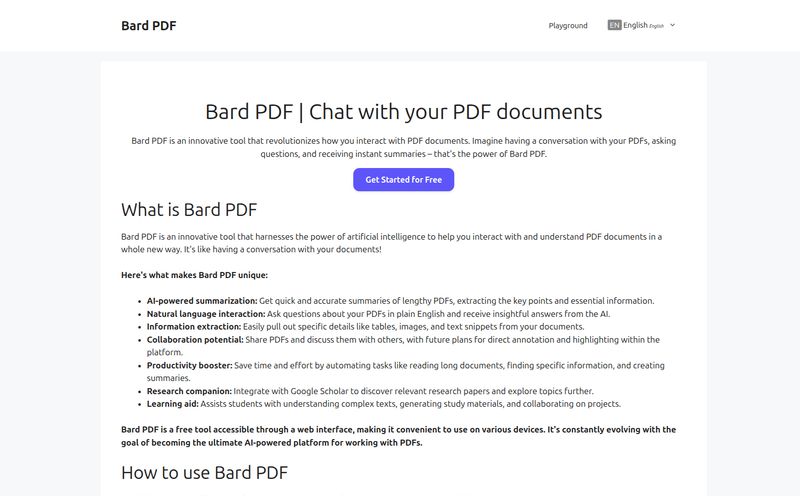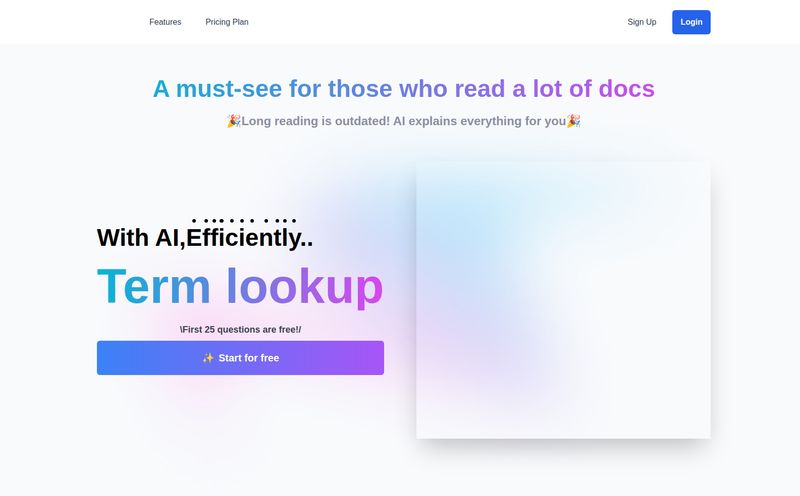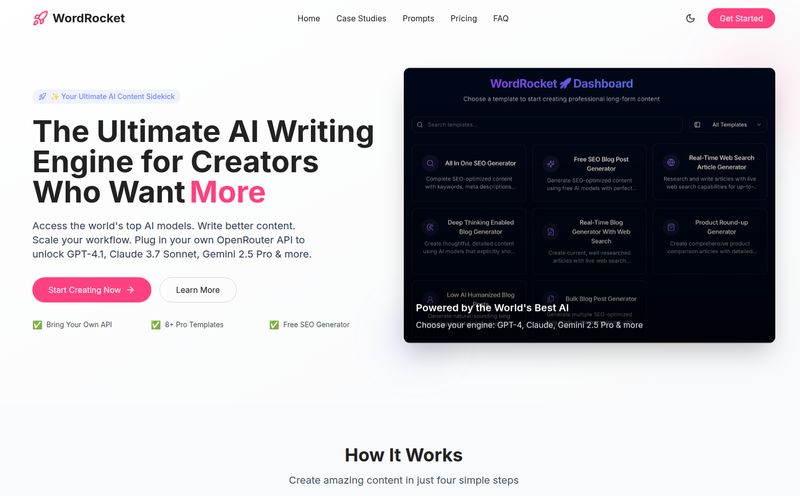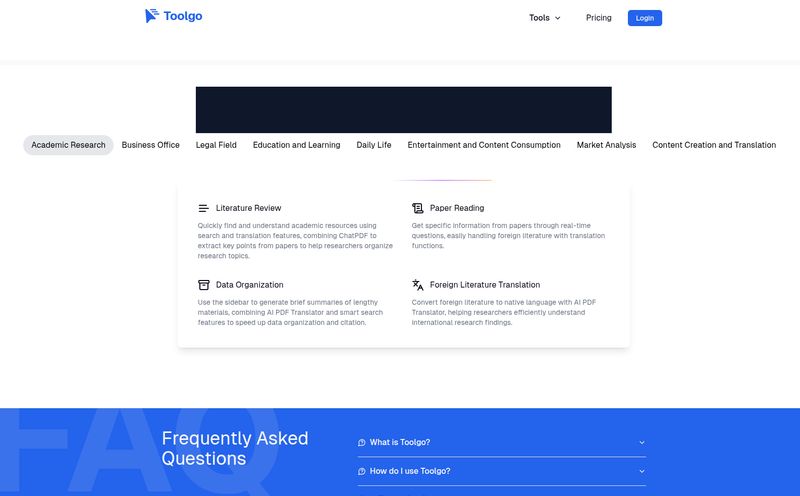If you’re in marketing, SEO, or any kind of content creation, your day is a relentless battle for words. Email subject lines. Ad copy. A witty tweet. That one product description that needs to be just right. We’re constantly pulling ideas out of thin air, and some days, the well feels pretty darn dry.
We’ve all been there, staring at a blinking cursor, wishing we could just summon a creative partner to get us unstared. For a moment, a little tool called SlashGPT looked like it might be that magic wand. The promise was so simple, so elegant, it felt almost… obvious. An AI text generation tool you could use anywhere, just by typing a simple command.
It sounded like the ultimate workflow hack. But like a lot of things in the hyper-speed world of AI tools, the story got a little weird. So, let's pour one out and talk about the brilliant idea that was SlashGPT.
The Simple, Brilliant Idea Behind SlashGPT
The concept behind SlashGPT was its superpower. No new tabs, no logging into another platform, no context switching. Just you, your text box, and a little bit of magic. All you had to do was type /gpt followed by your prompt, right inside whatever you were working on.
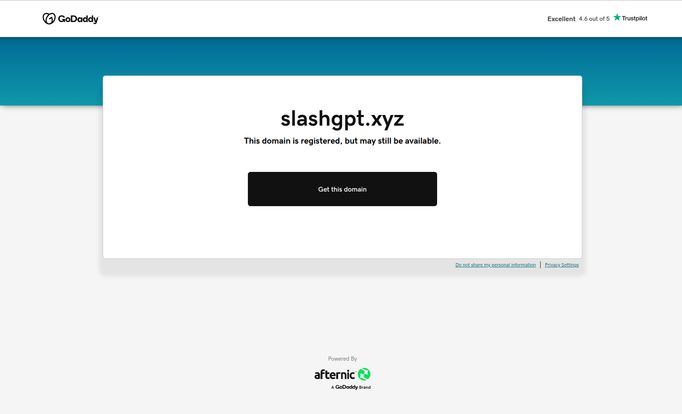
Visit SlashGPT
Think about that for a second. You're in your Gmail, about to send a follow-up. Instead of agonizing over the subject, you just type:
/gpt write a friendly but urgent subject line for an invoice reminder
And poof. The AI would do its thing, and you'd get a perfectly crafted subject line right where you needed it. It promised instant ChatGPT access without the hassle. It was meant to be the ultimate keyboard shortcut for your brain, seamlessly weaving AI-powered text generation into your existing habits. For a moment, it felt like the future.
A Day in the Life with the Ultimate AI Writing Assistant
I can just picture it. My morning coffee is kicking in, and I’m tackling the inbox. An email from a potential client needs a thoughtful reply. Instead of spending 15 minutes wordsmithing, I'd just type /gpt draft a warm, professional reply confirming my interest in the project and suggesting a call next week. Done.
Later, I’m scheduling social media posts. The creative juices aren’t flowing. /gpt give me 3 engaging twitter hooks about the latest Google algorithm update. It’s not about replacing my own expertise, but about smashing through writer's block. It’s a collaborator that lives in your browser. From writing alt-text for images to brainstorming blog post titles, the application was endless. It was less a tool and more a constant, low-friction creative partner.
This is the dream, right? Reducing the tiny moments of friction that add up to hours of lost productivity. And honestly, who hasnt wished for that?
So, Where Did It Go? The Curious Case of the Missing Domain
Here’s where our story takes a turn. I was genuinely excited to try this thing out, to see if it lived up to its promise. But when I went looking for the Chrome extension, I found... nothing. The official website, slashgpt.xyz, wasn't a sleek landing page. It was a GoDaddy parking page. You know the one: "This domain is registered, but may still be available."
Oof. In the tech world, that’s not a great sign. It's the digital equivalent of a "For Rent" sign on a supposedly bustling shop.
What does this mean? It could be anything, really. Maybe it was a passion project from a solo developer who got a new job and let the domain lapse. Perhaps it was an early casualty in the AI "gold rush," where hundreds of similar tools launched, and only a few survived. It’s a cautionary tale. A brilliant idea isn’t always enough to build a lasting product, especially when you're completely dependent on another company's tech (in this case, OpenAI's ChatGPT).
Evaluating a Ghost: The Pros and Cons of What Could Have Been
Even though SlashGPT seems to be a digital ghost, we can still analyze the idea. It’s a great case study in what makes a productivity tool truly great… or not.
The Obvious Upsides of Instant Access
The biggest pro was, without a doubt, the immediacy. By bringing ChatGPT to any text field, it eliminated the biggest hurdle to using AI for small tasks: the effort. The convenience of not having to switch tabs is a bigger deal than it sounds. It keeps you in the flow. For anyone whose job involves a lot of writing, this could have been a game-changer, simplifying text generation and making quick work of repetitive tasks.
The Inevitable Downsides and Dependencies
On the flip side, it had some clear limitations. First, it was a Chrome extension, so if you're a Firefox or Safari user, you were out of luck. More importantly, its performance was entirely tethered to ChatGPT. We all remember the early days when ChatGPT would go down or be at capacity. If ChatGPT was having a bad day, so was SlashGPT. There was also very little information about any advanced features or customization, suggesting it was likely a very simple, one-trick tool.
Filling the Void: Great SlashGPT Alternatives You Can Actually Use
The good news? The spirit of SlashGPT lives on! Its brilliant core idea—AI in every text box—has been picked up and polished by other developers. If you're looking for a tool to fill that void, you have some fantastic, well-supported options.
Here are a few I've personally used and can vouch for:
- Monica: This one is an absolute powerhouse. It's more than just a text generator; it's an all-in-one AI assistant that lives in your browser. It can read articles, summarize YouTube videos, and yes, it has a 'Quick Action' feature that lets you write and reply to text anywhere. It's what SlashGPT wanted to be when it grew up.
- Merlin: Very similar to the original concept, Merlin gives you ChatGPT access on any website. You can select text and ask Merlin to summarize, rewrite, or expand on it. It’s incredibly handy for research and day-to-day writing tasks.
- ChatGPT for Google: While not a universal tool, this official extension from the OpenAI team is a must-have. It displays ChatGPT responses right alongside your Google search results, which is unbelievably useful for quick queries and brainstorming.
While we mourn what SlashGPT could have been, these tools have taken the concept and run with it, offering more features, better support, and a future that doesn't involve a GoDaddy landing page.
Frequently Asked Questions about SlashGPT
What was SlashGPT?
SlashGPT was a planned Google Chrome extension designed to provide instant, AI-powered text generation. The idea was to allow users to access ChatGPT's capabilities in any text input field on any website simply by typing the command /gpt.
How was SlashGPT supposed to work?
A user would install the Chrome extension. Then, in any text box—like an email, a social media post, or a document—they could type /gpt followed by a prompt (e.g., /gpt write a funny tweet about Mondays). The extension would then replace the command with AI-generated text.
Is the SlashGPT extension still available?
No, it appears the project is no longer active. The official domain is up for sale, and the extension is not listed on the Chrome Web Store, suggesting it was either never fully launched or has since been abandoned.
Why is the SlashGPT domain for sale?
While we can only speculate, it's common for side projects or early-stage startups to be discontinued. The developer may have moved on to other things, or the project may not have gained the traction needed to justify maintaining it. The domain has likely expired and is now available for purchase.
What are some good alternatives to SlashGPT?
Excellent, well-supported alternatives include Monica, Merlin, and the official ChatGPT for Google extension. These tools offer similar (and often more advanced) functionality for integrating AI into your daily browsing and writing workflow.
Was SlashGPT a free tool?
There's no pricing information available, but given its simple functionality and the typical model for such Chrome extensions, it was likely intended to be free, possibly with a premium tier planned for the future that never materialized.
A Shooting Star in the AI Cosmos
So, that's the story of SlashGPT. It was a shooting star—a brilliant, simple idea that streaked across the sky and then fizzled out. It’s a perfect snapshot of the chaotic, exciting, and sometimes disappointing world of modern AI development. For every established tool, there are a dozen brilliant ideas that just don't quite make it.
But the dream of seamless, integrated AI isn't dead. In fact, it’s thriving. SlashGPT may be a ghost, but its spirit—the drive to make powerful technology effortless to use—is exactly what pushes the industry forward. And I, for one, can't wait to see what comes next.
